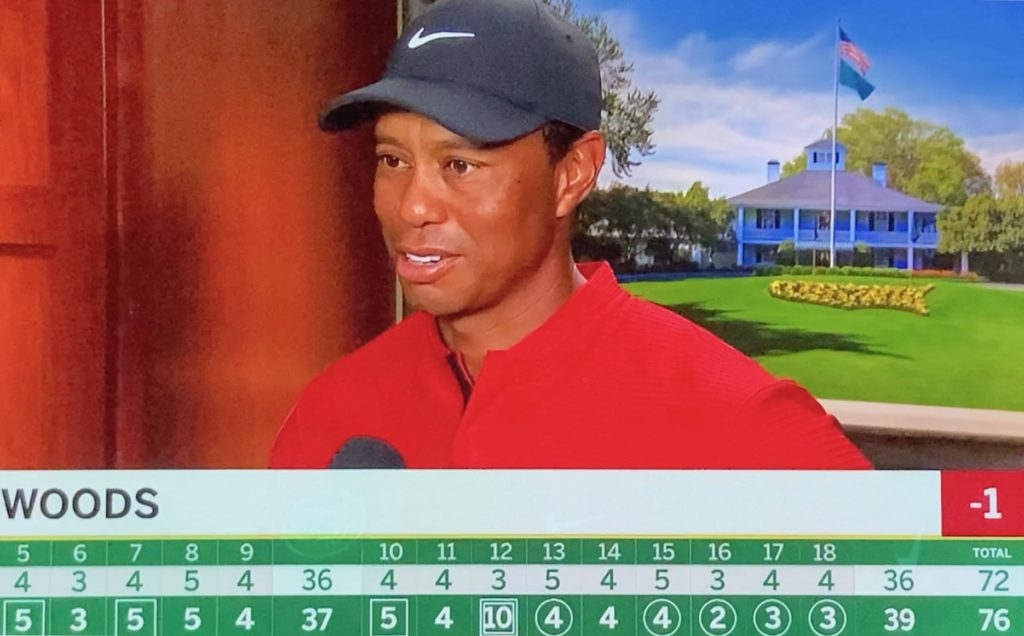Character isn’t always reflected through winning. The truth is that we often learn more about a person’s character when they’re losing. Or when they’ve lost.
No, I’m not talking about politics.
Buried underneath the headline of Dustin Johnson’s record-setting victory a the 2020 Masters is the story of a mini-comeback by another player who didn’t even come close to having the lead on Sunday. I’m talking about Tiger Woods.
Going into the final round, Tiger was five under par — 10 shots out of first place. He was trying to defend the world-shocking championship he claimed at the 2019 Masters. But being that far back from Johnson at the start of Sunday meant that he didn’t really have a chance.
On the famous par-three 12th hole, which was the turning point in Tiger’s victory last year, he dunked his tee shot into Rae’s Creek. This was a surprise, but not that big a deal. Even legends hit bad shots. Every day.
But after that mistake, it took Tiger Woods another nine shots from just 30 feet away to get the ball in the hole — including another two swims. He made a 10. A TEN. It’s the highest score he’s ever put on a pro card in the more than 20,000 tournament holes he’s played since 1996.
https://www.youtube.com/watch?v=HdCT6m7fkgM&feature=youtu.be
Tiger just couldn’t stop hitting bad shots. If you’ve played any golf, you understand how this feels.
But what happened next was truly amazing: Tiger birdied five of the last six holes on his way to the clubhouse. To do that at Augusta National is a feat under any circumstance. To do it after you’ve just made a 10 is a comeback on a whole different level. It’s mental Mount Everest.
I called my Dad after the tournament to see if he’d seen the 10 and if he knew about what Tiger had done after that. He got my point before I could make it:
“That shows you his character — that he doesn’t quit. After a 10! Any other guy would have thrown in the towel.”
Of course, like anyone who follows the Tour, my Dad knows full well that there are a ton of mentally tough players out there.
But there was just something special about Tiger stringing those five tweeters together down the stretch after what looked like a humiliating septuple-bogey.
In the post-round interview, Tiger explained how he’d miscalculated the wind on that first tee-shot. He described it with a smile, which was nice to see. But then he added something that spoke to his character:

“This is unlike any other sport. You’re so alone out there and you have to figure it out and ya have to fight. No one’s gonna pull you off the bump, and ya have to just figure it out. And I did coming in.”
Think of all the things in life that this principle applies to — including life.
In the 15 years before Tiger Woods had his fall from stardom in 2009, I wasn’t a big fan. That’s not to say I didn’t love watching him play; the guy was the absolute best in the world in my favorite sport in the world. I just didn’t find him all that graceful during the times when he wasn’t winning.
My favorite player growing up was Tom Watson. He’s universally considered one of golf’s all-time. When I played competitively as a kid, he and Nicklaus were the dominant PGA stars.
But I also liked Watson’s demeanor. He had a killer instinct when it came to winning, but he never reflected bitterness when he didn’t.
Imagine my thrill a few years ago when a friend of mine gave Watson a copy of the book I’d written, and of his own volition, he sent me a handwritten note of congratulations. He also shared his thoughts on Congress, the book’s subject. That, I thought to myself, was class.
I never sensed that kind of quality in Tiger Woods. At least prior to 2010. In February of that year, Tiger held a live press event where he made a public statement about the very public troubles he was having in his life. In his address, he acknowledged the pain he had caused his loved ones —and his fans:
“Every one of you has a good reason to be critical of me…Parents used to point to me as a role model for their kids. I owe all those families a special apology. I want to say to them that I am truly sorry.”
A lot of people know this feeling of being at an indescribably low place in their lives. I am one of them. Putting the pieces back together is rough stuff. But hardly any of us have to go through this process in the public eye, at least partially, like Tiger Woods had to.
For nearly a decade after Tiger hit bottom, the question of whether he would ever win another major PGA championship became one of the most hotly debated topics in sports.
I always thought it was quite possible, and then I had the great luck of getting to witness a live piece of it last year. My Dad took me to my first Masters, and I will never forget us watching Tiger walk up and hit his tee shot on the par-three 12th — the very same hole he colossally blundered today.
The amount of grit and work ethic it took for Tiger Woods to stick with his comeback for a full decade before realizing his fifth Masters championship is nothing short of astonishing. Of course, those qualities are what got him to the apex of the golf world in the first place.
But along his return to glory, Tiger seemed different. At least to my spectator eye. The high-octane focus on winning was still there, but it seemed like something else had grown alongside it. Perspective. Grace. Character.
I could be completely wrong about this. I’m just a peanut in a massive golf gallery making judgments about a champion who’s spent 75 percent of his 44-year life on a world stage in the social media age.
But watching Tiger bounce back after making that 10, with no shot of winning, and then laughing about it and sliding the green jacket onto the new Masters champ with a huge smile — it all just reinforced my opinion of him.
I still love watching Tiger Woods play golf. Even more so at this stage of his career — because it’s no longer just about how damn good he is. It’s because of the way he carries himself. It’s because I’m inspired by his character.


